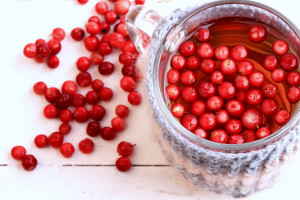Written by Greg Arnold, DC, CSCS. A highly concentrated and standardized cranberry extract significantly reduced the number of urinary tract infections in elderly men with benign prostatic hyperplasia.
 Benign prostatic hyperplasia (BPH) is a problem men deal with as they age. It is defined as “a progressive enlargement of the prostate gland as a consequence of the non-malignant proliferation of prostatic stromal and epithelial cells” 1. The most common symptom of BPH is an impaired ability to completely void their bladder, which over time can cause an increased occurrence of urinary tract infections 2.
Benign prostatic hyperplasia (BPH) is a problem men deal with as they age. It is defined as “a progressive enlargement of the prostate gland as a consequence of the non-malignant proliferation of prostatic stromal and epithelial cells” 1. The most common symptom of BPH is an impaired ability to completely void their bladder, which over time can cause an increased occurrence of urinary tract infections 2.
Appproxiamtely 30-50% of men suffering from benign prostatic hyperplasia also suffer from urinary tract infections 3, thus necessitating the need to effectively treat these infections. In a 2016 study 4, 43 men between the ages of 63 and 66, and with moderate BPH, received advice on “standard management” of urinary tract infection through lifestyle changes (defined as “accurate washing, drinking and voiding at correct times, low caffeine, alcohol and spice intake, moderate physical activity”). The informed participants freely decided to receive either “standard management only” to control their UTIs (20 = control group)) or standard management along with a daily capsule of a cranberry extract called Anthocran®. (23 participants). Each capsule of Anthocran® contains 120 ml of a highly concentrated and standardized cranberry extract that provides 36 mg of antioxidants called proanthyocyanins.
After 60 consecutive days of treatment, researchers found that cranberry extract plus standard management was more effective than standard management alone in reducing the number of UTIs. tThose in the cranberry extract plus standard treatment group experienced a 75% decline in the mean number of urinary tract infections (3.2 to 0.8, p =0.0001) compared to an insignificant 33.2% decline in the placebo group (3.14 to 2.1). In fact, the mean number of UTIs over the 60 study days was significantly lower in the supplemental group (0.8) compared to the control group (2.1), p=00.62.). When attempting to propose a mechanism for these effects, the researchers cite cranberry’s ability to inhibit E.Coli adhesion to epithelial cells, and its anti-inflammatory action in chronic bacterial prostatitis and anti-tumor activity 5-7.
Researchers conclude that, “Cranberry supplementation could be effective and safe as a supplementary management for the prevention of recurrent urinary tract infections in elderly men suffering from BPH.” However, larger studies that investigate cranberries effect on inflammatory markers such as C-reactive protein and prolactin are r recommended.
Source: Ledda, A., et al. “Supplementation with high titer cranberry extract (Anthocran®) for the prevention of recurrent urinary tract infections in elderly men suffering from moderate prostatic hyperplasia: a pilot study.” Eur Rev Med Pharmacol Sci 20.24 (2016): 5205-5209.
Click here to read the full text study.
Posted May 31, 2017.
Greg Arnold is a Chiropractic Physician practicing in Hauppauge, NY. You can contact Dr. Arnold directly by emailing him at PitchingDoc@msn.com or visiting his web site at www.PitchingDoc.com.
References:
- Lepor H. Pathophysiology, epidemiology, and natural history of benign prostatic hyperplasia. Reviews in urology. 2004;6(Suppl 9):S3.
- Schaeffer AJ, Nicolle LE. Urinary tract infections in older men. New England Journal of Medicine. 2016;374(6):562-571.
- Roehrborn CG. Male lower urinary tract symptoms (LUTS) and benign prostatic hyperplasia (BPH). Medical Clinics of North America. 2011;95(1):87-100.
- Ledda A, Belcaro G, Dugall M, et al. Supplementation with high titer cranberry extract (Anthocran®) for the prevention of recurrent urinary tract infections in elderly men suffering from moderate prostatic hyperplasia: a pilot study. Eur Rev Med Pharmacol Sci. 2016;20(24):5205-5209.
- Narayansingh R, Hurta RA. Cranberry extract and quercetin modulate the expression of cyclooxygenase‐2 (COX‐2) and IκBα in human colon cancer cells. Journal of the Science of Food and Agriculture. 2009;89(3):542-547.
- Weh KM, Clarke J, Kresty LA. Cranberries and Cancer: An Update of Preclinical Studies Evaluating the Cancer Inhibitory Potential of Cranberry and Cranberry Derived Constituents. Antioxidants. 2016;5(3):27.
- Ferguson PJ, Kurowska EM, Freeman DJ, Chambers AF, Koropatnick J. In vivo inhibition of growth of human tumor lines by flavonoid fractions from cranberry extract. Nutrition and cancer. 2006;56(1):86-94.
